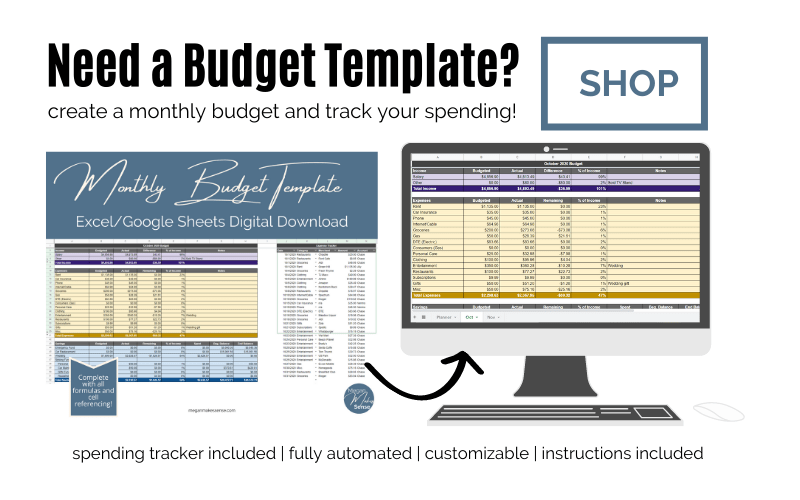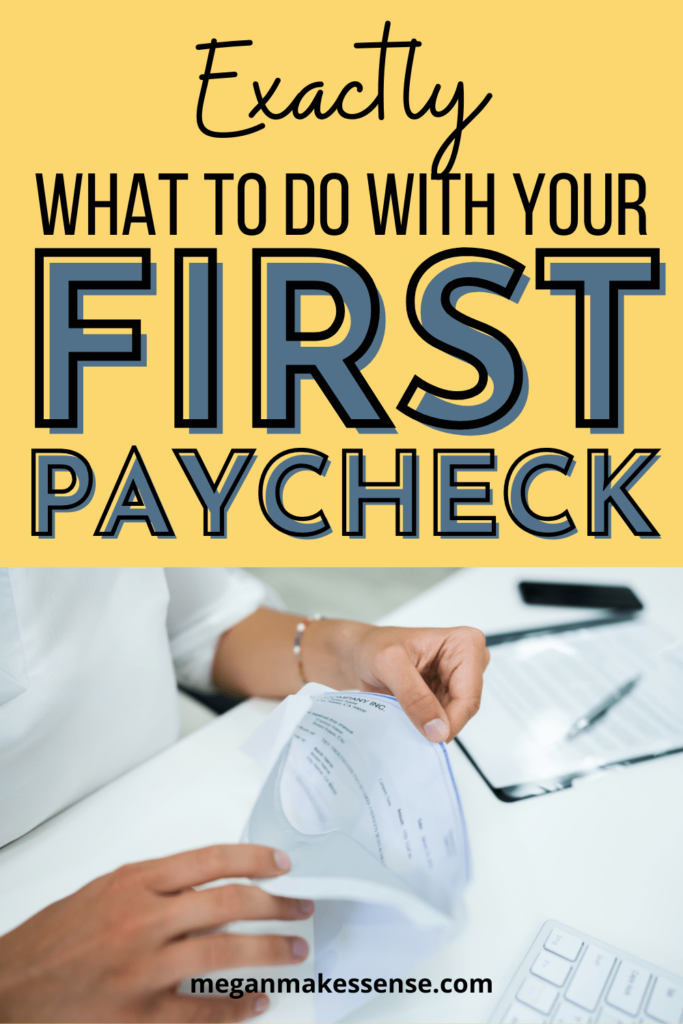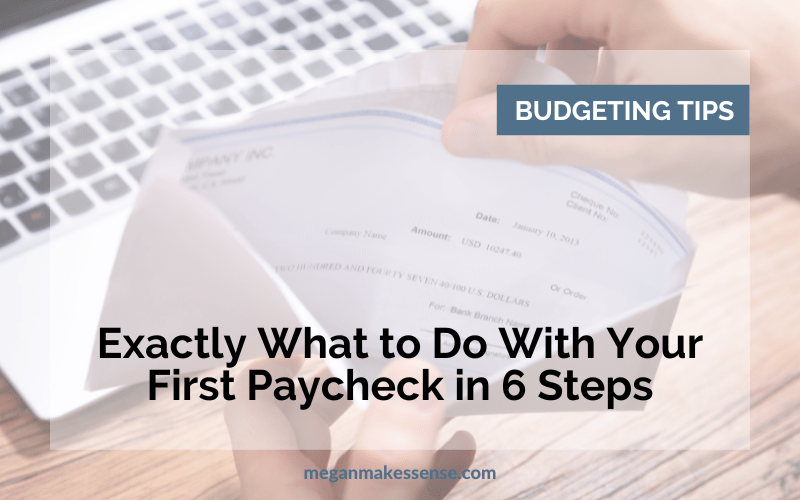So you got a new job, congrats!
New jobs also come with new paychecks (because let’s be honest, we all wouldn’t be at our jobs without the paychecks).
Whether this is your first job out of college, or you recently made a career change, figuring out what to do with your first paycheck can be confusing.
When I started my first job, I was overwhelmed with what to do with that first “real” salary since I had so many competing priorities as a new college grad with $56,000 in student loan debt.
My first paycheck as a salaried engineer was the most money I have ever had hitting my bank account all at once. I didn’t want to mess it up!
This post will show you exactly what to do with your first paycheck, step by step.
From understanding your pay stub to figuring out how to prioritize paying bills, saving money, contributing to retirement, and paying down debt, this post will give you a prioritized list of exactly what to do with your first paycheck in order of importance.
What to Do With Your First Paycheck
1. Understand Your Pay Stub
The absolute first thing you need to do after getting your first paycheck is to understand your pay stub and double check everything.
Your pay stub will show you a summary of your gross income for that pay period, tax deductions, health insurance, 401k deductions, and anything else that comes out of your paycheck before it hits your bank account.
It’s always a good idea to double check every pay stub (especially the first) to ensure that your gross pay and deductions are correct because mistakes happen!
Take your yearly gross salary and divide by your number of pay periods (26 if you get paid biweekly or 24 if you get paid twice monthly). Does the gross pay at the top of your check match this number?
If you were supposed to get a signing bonus or relocation package with your new job, is that reflected in your first paycheck?
When figuring out what to do with your first paycheck, ensuring that your first paycheck is actually correct is the first step!

2. Check Your Tax Withholdings
Ah, taxes. Unfortunately, paying taxes is an inevitable part of being an income-earning citizen.
Have you ever compared your gross pay to your net pay? Depressing.
Did you know that you can estimate how much you’ll owe in taxes for the entire year using the IRS tax withholding calculator?
All you need is your latest pay stub.
Plug the information into the calculator, and it will spit out your estimated tax burden (what you owe) for the year.
At the end, it will give you a projection on if you’re on track for a tax refund or if you’ll come up short based on your current withholdings.
If you’re due for a wickedly large refund, you might want to dial back your withholdings in your paycheck.
On the flip side, if you’re on track to owe money, you might want to bump them up. You can adjust your withholdings by submitting a new form W4 to your employer at any time during the year.
It’s a good idea to run this tax withholding calculator each time you change jobs, get a raise, bonus, etc. When your income changes, your tax burden changes as well!
Making sure your tax withholdings are on track is one of the first things to do with your first paycheck.
3. Contribute to Your 401k
This one is a bit of a curveball because you would have had to elect to contribute to your 401k before receiving your first paycheck.
Your 401k is the easiest place to start saving for retirement.
Contributions come out of your paycheck before it hits your bank account and it is automatically invested on your behalf. This is amazing because you’ll never forget to contribute and you won’t accidentally spend that money elsewhere!
If you start contributing with your first paycheck, you’ll be used to not seeing that money in your bank account. This is awesome because you’ll automatically be living under your means and building wealth!
I recommend contributing at least up to the full company match. Contribute more if you can afford to!
The more you save now while you’re young, the more options you’ll have in the future (thanks to compound interest!)
Related: 6 Must-Know Questions to Ask About Your 401k Plan (What Beginners Really Need to Know)
4. Budget for Your Needs
If you’re figuring out what to do with your first paycheck, budgeting for your needs should be at the top of your list.
Especially if you had to relocate for your new job, you probably have a new set of bills that come along with it (and moving is expensive!).
Everyone needs a place to live, food to eat, a car that uses fuel to get to work, etc. And all of these things cost money!
If you haven’t already, make a list of necessary expenses to add to your budget. How many of these items need to be paid for out of your first paycheck?
Has your housing expense changed? What is the cost of living in your (potentially) new city? Do you need to buy specific clothing for your new job?
It might be helpful to write down the due dates of all of your bills and paychecks on a calendar. This way, you can figure out how much of each paycheck to reserve for bills.
Create a monthly budget to figure out how much of your new income you need to spend in order to live. I personally use my Excel/Google Sheets budget template.
It only takes a few minutes per week to update with my spending!
Budgeting your paychecks might take a few months to get a handle on, so don’t give up if it doesn’t go perfectly the first few times.
Figuring out what to do with your first paycheck can be tricky, but always remember to set money aside for needs first.

5. Pay off Any Debt Accrued During Your Transition
Once you’ve put money in your 401k and have set aside money for needs, it’s time to pay off any credit card debt that you may have racked up during your transition.
I totally get it, moving can be so expensive.
Without careful budgeting, it’s easy to swipe the credit card for new furniture, apartment deposits, and moving trucks without figuring out where that money will come from first.
Do yourself a favor and earmark some of that first paycheck to pay off a chunk of this debt (if applicable).
Credit card interest rates are insane, and will easily put you in a financial hole if you’re not careful. If you can’t pay off the balance in a few months, it might be worth looking into a balance transfer to a 0% apr credit card or personal loan to save on interest while you work on paying it off.
Trying to build financial stability while you’re in credit card debt is like trying to run up the fastest down escalator at the mall.
As much as I love talking about the amazing wealth-building power of compound interest, it can work against you in the form of 24% interest rates on credit card balances.
So get that cleaned up starting with your first paycheck! I would not do anything else with my money until that is completely paid off.
Go scorched-earth for a season and rice-and-beans it until your high-interest debt is gone!
And if you’re like a ton of other folks that think leaving a balance on your credit card increases your credit score, check out this post for 5 credit card myths that are keeping you broke and in debt.
6. Reevaluate Your Emergency Fund
Once you get your high interest debt under control, it’s time to reevaluate your emergency fund.
Did you have to use any of your emergency reserves during your job transition and/or move?
Or maybe this is your first job out of college and you’re starting from zero (this was me just a few years ago!).
Having a solid emergency fund is the first step toward a solid financial foundation.
Skip this step, and any unexpected expense will reveal the cracks in your foundation and inevitably set you further back (and we just talked about how detrimental credit card debt is).
If you don’t have any high interest debt and are wondering what to do with your first paycheck, beefing up (or starting) your emergency fund should be your top priority.
Start small if you need to and save that first $1000. Then aim to have 1 months’ worth of expenses and go from there.
Most experts recommend having a solid 3-6 months’ of expenses saved in cash in a savings account.
Related: How Big Should Your Emergency Fund Be?
7. Avoid Lifestyle Inflation
Getting your first “real job” paycheck might tempt you to buy a new car immediately or go on a shopping spree for new clothes to look the part at your new job.
I would highly advise against impulse purchases like this. Especially with your first paycheck.
Give yourself some time to get over the dopamine hit of that first paycheck before you go make any major purchases.
Learn how to get a handle on your budget first. Understand which purchases are really worth it to you before you go blowing your money on anything and everything society says is cool.
Make sure that you’re living below your means and have a solid financial foundation before upgrading your lifestyle.
Trust me, future you will be thankful!
When I started my first job out of college, I got so close to upgrading from my 2004 high school car into a brand-new SUV with a nice monthly payment.
I thought I needed a new car to prove how successful I was as an entry-level engineer. I was making great money and needed people to know, right? (Newsflash, that entry level salary doesn’t go as far as you think it will).
I am so thankful that I prioritized my financial well being over looking cool in the parking lot. Even 3 years later, I’m grateful that I didn’t upgrade my car right away and waited until I could afford a newer, used car in cash.
Lifestyle inflation can be so tough to beat. Our society is very consumeristic and we are constantly advertised to about the latest new thing.
Plus, the rise of social media has taken keeping up with the Joneses to a whole new level.
Just remember this: the type of car you drive, purse you carry, or clothes you wear say nothing about you as a person.
Would you rather drive a brand new car every 2 years if it meant you couldn’t save any money for retirement and had to work until you die?
Is financing the trendiest clothing and new iPhone on a credit card worth it if you can’t sleep well at night knowing that debt is crushing you?
Is a 5000 sq ft home worth it if it means 40% of your income goes toward housing and you have to pass down mortgage debt to your children?
I know it’s so easy to get that first paycheck and be tempted to blow it all on “treating yourself.” And definitely remember to treat yourself every now and then, just don’t let it come at the cost of your financial security.
Like everything in life, it’s important to have balance with your personal finances.
Related: 6 Proven Strategies to Avoid Lifestyle Inflation

Summarizing What to Do With Your First Paycheck
Let’s summarize what to do with your first paycheck:
1. Understand your pay stub. Make sure it’s accurate and any signing bonuses, relocation, etc are included, if applicable.
2. Check your tax withholdings using the IRS tax withholding calculator. Will your current withholdings result in you owing the IRS or getting a huge refund? Update your form W4 with your employer if anything needs to be adjusted.
3. Contribute to your 401k. If you’ve already set up your 401k, it may take a few pay periods to reflect in your paychecks, so be patient! Make sure you’re contributing enough to get your full employer match, if you have one.
4. Set money aside to budget for your needs. How have your expenses changed? Time to update your budget to reflect those changes!
5. Pay off any high-interest debt accrued during the transition. Credit card debt is very dangerous and can easily put you in a huge hole financially. Go balls to the wall and get rid of it asap, starting with your first paycheck!
6. Reevaluate your emergency savings. Everyone needs an emergency fund, liquid, in cash. Start small and build it up to 3 – 6 months of expenses over time.
7. Avoid lifestyle inflation. How many of your purchases do you truly make for you, and you only? Would you still make the same purchase decisions if no one would see? Learn how to balance saving with intentional spending to get the most happiness-per-dollar-spent while also securing your financial future.
And that’s a wrap on what to do with your first paycheck!
Did you do any of these things with your first paycheck? Let me know in the comments below!
-Megan
Megan is an automotive engineer, newlywed, and personal finance blogger from the midwest. She found her passion for personal finance after starting her first “real job” after graduating college. Now, she helps other young professionals become more intentional with their money in order to build wealth for financial freedom. In her free time, she loves to travel, hike, and play euchre with her family. Read more about her story here.

